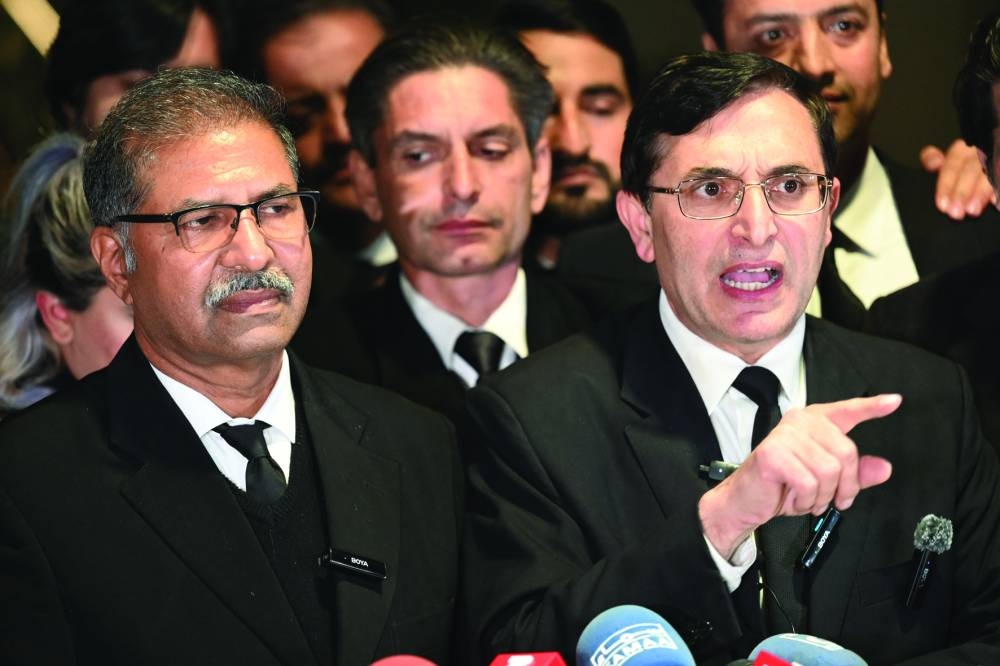In a ruling that will considerably impact the electoral landscape, the Supreme Court of Pakistan overturned the decision of the Peshawar High Court (PHC) yesterday.
The PHC’s decision had previously reinstated the ‘bat’ as the electoral symbol for jailed former prime minister Imran Khan’s Pakistan Tehreek-e-Insaf (PTI) party in the upcoming general elections.
However, the Supreme Court’s verdict means that PTI candidates will now have to contest as independents, a massive setback for the party.
The verdict was announced a little before the midnight after a marathon hearing that lasted two entire days.
The South Asian nation of more than 240mn people votes on February 8 in a general election rights groups say lacks credibility following a crackdown against Khan’s immensely popular party.
The former international cricketing star’s party has long used the cricket bat as a symbol for voters to recognise it at the ballot box, in a nation where the adult literacy rate is just 58%, according to World Bank data.
“The ruling delivers one of the biggest electoral blows to date to what is likely the country’s most popular political party,” Michael Kugelman, director of the South Asia Institute at the Washington-based Wilson Center, told AFP.
“In a country with high illiteracy rates, many will struggle to know who to vote for without the bat symbol,” he said, warning of a “systematic effort” by the political establishment to sideline the PTI.
Chief Justice Qazi Faez Isa while announcing the verdict, emphasised that the Election Commission of Pakistan (ECP) had been urging PTI to conduct intra-party elections since May 24, 2021, a period during which PTI held power both federally and in various provinces.
The CJP clarified that there was no evidence of victimisation or discrimination against PTI by the ECP.
None of the mainstream political parties vying for power in the elections have even been questioned about their intra-party elections either by the ECP or Supreme Court.
The ECP’s decision on December 22, refusing PTI its electoral symbol due to non-compliance with intra-party election rules, led PTI to approach the PHC, which held the ECP decision unlawful and without legal consequence.
During the hearing yesterday, PTI’s counsel argued that the intra-party elections were conducted according to the party’s constitution and that the ECP had not pointed out any irregularities in its decision. However, the contention was that the appointment of the party’s CEC was flawed. PTI’s lawyer expressed confidence in appealing against the verdict and stressed the significance of upholding fundamental rights in the judicial system.
PTI chairman Barrister Gohar Khan announced the party’s intention to challenge the recent court ruling. He remained optimistic about overturning the decision.
Speaking to reporters in Islamabad, Khan pointed out the significant consequences of revoking PTI’s electoral symbol, noting it jeopardised 227 reserved seats and could potentially lead to corrupt practices.
Khan highlighted that none of the 14 individuals who filed the petition were members of PTI. He further stated that among the party’s 837,950 members, there had been no objections raised regarding the internal party elections.
He underscored the critical role of the judiciary in protecting the fundamental rights of all citizens. Khan emphasised the importance of the courts in ensuring that no political entity is unjustly excluded from participating in elections.
Concluding his remarks, Khan voiced confidence in the public’s support for PTI and Imran Khan on election day.
The Supreme Court’s decision to revoke PTI’s electoral symbol sparked a wide range of reactions. Legal experts and political analysts expressed shock and concern over the verdict.
Lawyer Reema Omer described the decision as “excessive, punitive” and detrimental to fundamental rights. Election candidate and lawyer Jibran Nasir highlighted the “disenfranchisement of millions of voters” due to this verdict. Barrister Asad Rahim criticised the Supreme Court’s credibility and logic in this decision, while activist Ammar Ali Jan viewed it as a defeat for democratic norms in Pakistan.
Uzair Younis, director of the Atlantic Council’s Pakistan Initiative, lamented the impact on Pakistan’s democracy, and lawyer Hassan A Niazi pointed out the contradiction with the court’s previous jurisprudence in the (late prime minister) Benazir Bhutto case concerning fundamental rights. He emphasised that the rights of millions of voters were at stake.
Imran Khan rose to fame in cricket-crazed Pakistan by captaining the national team to victory against England in the 1992 ODI World Cup final, using the triumph to springboard his philanthropic career, which then gave way to politics.
He has been pummelled by a barrage of legal cases since being ousted in April 2022 after falling out with the country’s top military brass, and remains in custody on a slew of allegations.
He has been barred from standing for office after being convicted, although his sentence was later overturned.
Former three-time prime minister Nawaz Sharif is considered the frontrunner in the election after getting the backing of the country’s generals.
Analysts say it’s a sign the three-time former prime minister is the favoured candidate of the top brass. The Human Rights Commission of Pakistan says the election has already been marred by “pre-poll rigging”, with Khan and his party being squeezed out of the race.
Events
Supreme Court pulls PTI’s poll symbol in near-midnight verdict
n Legal experts, rights activists express shock at ruling; party to file review appeal

Pakistan Tehreek-e-Insaf party chairman Gohar Khan (right) standing next to Barrister Ali Zafar and other legal team members speak to the media outside the Supreme Court building after the verdict in Islamabad last night. (AFP)
